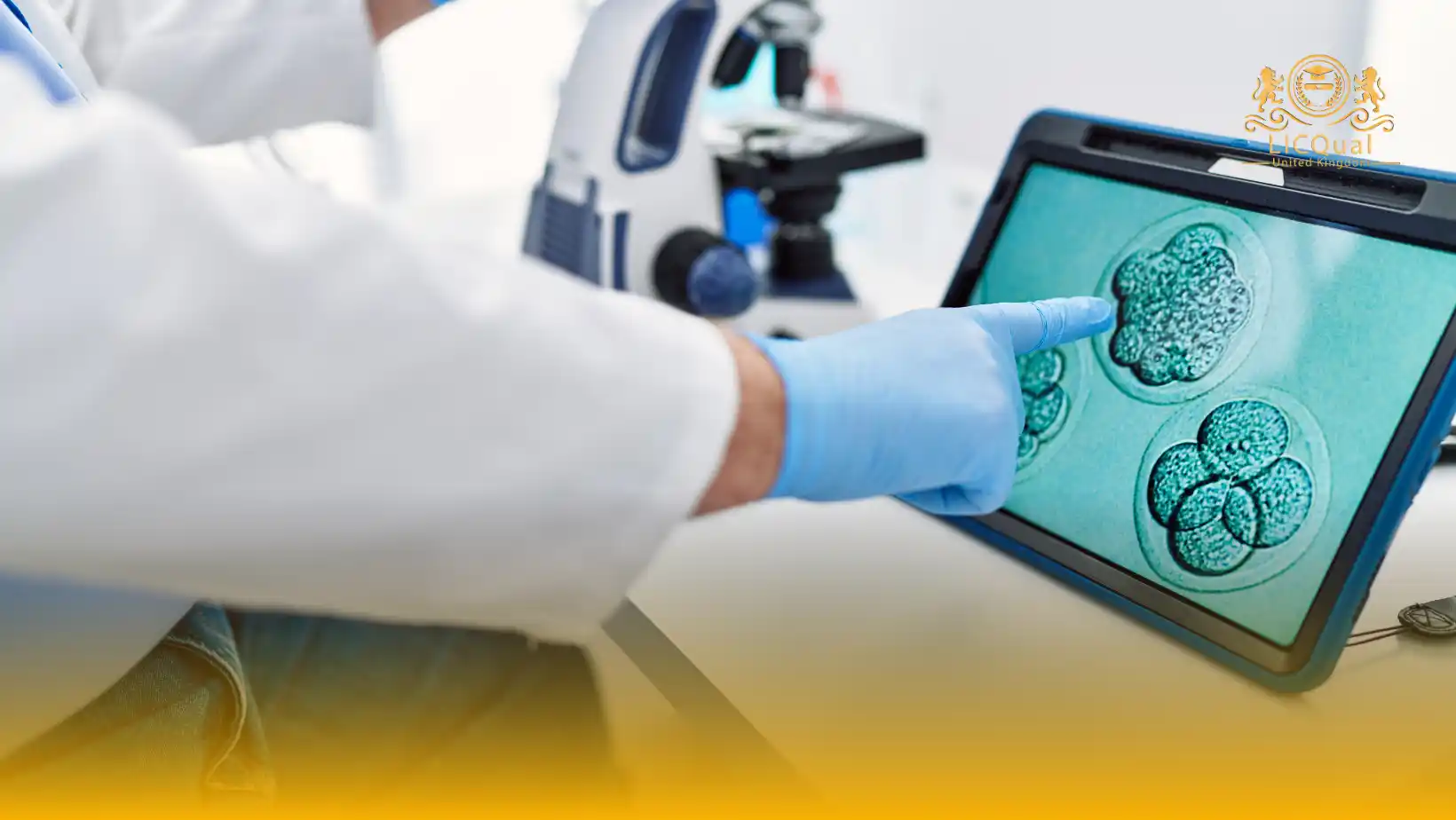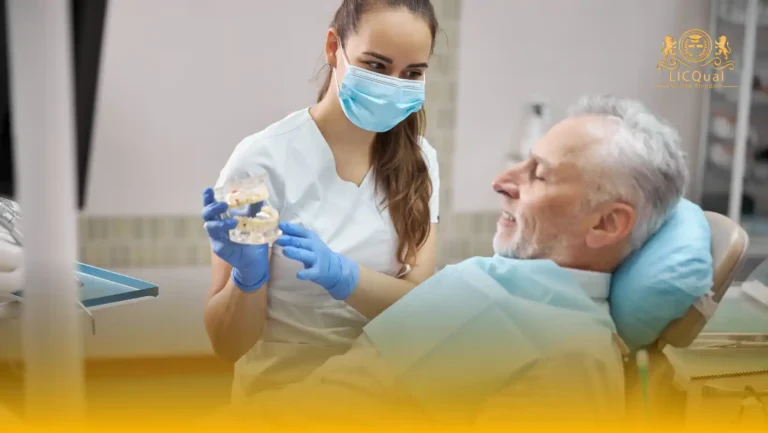The LICQual Level 3 Certificate in Reproductive Medicine (Cert RM) is a specialised qualification designed for healthcare professionals who wish to expand their expertise in reproductive health and medicine. This programme is not intended for fresh candidates but is specifically tailored for experienced practitioners seeking to strengthen their knowledge, improve their career prospects, and demonstrate a commitment to Continuing Professional Development (CPD).
Reproductive medicine is a vital area of modern healthcare, encompassing fertility management, reproductive endocrinology, assisted reproductive technologies (ART), and ethical considerations in reproductive health. This qualification equips learners with the essential knowledge and practical skills needed to address the challenges of reproductive healthcare and provide evidence-based, patient-centred solutions. By completing this course, learners will be better prepared to contribute to improved outcomes in clinical practice, research, and healthcare services.
Centres delivering the LICQual Level 3 Certificate in Reproductive Medicine must ensure that they uphold the highest standards of teaching and learner support. This includes employing competent and qualified staff with relevant expertise, as well as providing access to appropriate learning resources, clinical references, and facilities that foster effective knowledge transfer. Such measures are critical to ensuring high-quality training delivery and learner success.
Ultimately, this qualification empowers learners to enhance their professional competence in reproductive medicine, positioning them for career progression and leadership roles in healthcare, fertility clinics, and specialised medical services.
Course Overview
Qualification Title
LICQual Level 3 Certificate in Reproductive Medicine (Cert RM)
Total Units
6
Total Credits
24
GLH
120
Qualification #
LICQ2200848
Qualification Specification
To enroll in the LICQual Level 3 Certificate in Reproductive Medicine (Cert RM), applicants must meet the following criteria:
|
Qualification# |
Unit Title |
Credits |
GLH |
|---|---|---|---|
|
LICQ2200848-1 |
Foundations of Reproductive Medicine |
4 |
20 |
|
LICQ2200848-2 |
Fertility and Infertility: Causes, Diagnosis, and Management |
4 |
20 |
|
LICQ2200848-3 |
Assisted Reproductive Technologies (ART) |
4 |
20 |
|
LICQ2200848-4 |
Reproductive Health and Endocrine Disorders |
4 |
20 |
|
LICQ2200848-5 |
Ethical, Legal, and Professional Issues in Reproductive Medicine |
4 |
20 |
|
LICQ2200848-6 |
Reproductive Medicine in Clinical and Community Practice |
4 |
20 |
By the end of this course, learners will be able to:
Unit 1: Foundations of Reproductive Medicine
Learning Outcomes:
- Understand the anatomy and physiology of the male and female reproductive systems.
- Explain the hormonal regulation of reproduction and fertility.
- Analyse the principles of reproductive endocrinology and their clinical applications.
- Apply knowledge of reproductive health to clinical and healthcare practice.
Unit 2: Fertility and Infertility: Causes, Diagnosis, and Management
Learning Outcomes:
- Identify common causes of infertility in both men and women.
- Demonstrate knowledge of diagnostic investigations used in fertility assessment.
- Apply evidence-based approaches to the management of infertility.
- Develop strategies to support patients undergoing fertility treatment.
Unit 3: Assisted Reproductive Technologies (ART)
Learning Outcomes:
- Understand the principles and procedures of IVF, IUI, and related ART techniques.
- Evaluate the benefits, risks, and limitations of assisted reproductive technologies.
- Apply ethical and professional considerations in ART practices.
- Demonstrate knowledge of laboratory and clinical processes involved in ART.
Unit 4: Reproductive Health and Endocrine Disorders
Learning Outcomes:
- Recognise common reproductive and endocrine disorders affecting fertility.
- Analyse the relationship between hormonal imbalances and reproductive health.
- Apply diagnostic and management strategies for reproductive system disorders.
- Evaluate the impact of reproductive health issues on overall patient wellbeing.
Unit 5: Ethical, Legal, and Professional Issues in Reproductive Medicine
Learning Outcomes:
- Analyse ethical dilemmas in reproductive medicine, including fertility treatment and patient choice.
- Understand legal frameworks and patient rights within reproductive healthcare.
- Apply safeguarding policies and professional standards to practice.
- Demonstrate ethical decision-making in sensitive reproductive health cases.
Unit 6: Reproductive Medicine in Clinical and Community Practice
Learning Outcomes:
- Understand the role of reproductive medicine in clinical and community healthcare.
- Evaluate multidisciplinary approaches to reproductive health services.
- Develop effective patient counselling and support strategies.
- Promote reproductive health awareness and prevention strategies within communities.
The LICQual Level 3 Certificate in Reproductive Medicine (Cert RM) is designed for healthcare professionals who want to specialize in fertility, reproductive health, and assisted reproductive technologies. This Level 3 Reproductive Medicine certification is ideal for doctors, nurses, allied health practitioners, and medical students who aim to strengthen their expertise in reproductive endocrinology, infertility management, and patient‑centered care. With its globally recognized qualification and CPD‑accredited training, this program is perfect for anyone seeking a career‑boosting certification in reproductive medicine.
1. Doctors and Physicians in Reproductive Health
- Gain advanced knowledge in reproductive endocrinology and fertility care
- Strengthen credentials with a globally recognized certification
- Learn evidence‑based approaches to infertility management
- Improve patient outcomes through advanced reproductive techniques
- Boost career progression in fertility clinics and hospitals
2. Registered Nurses and Midwives
- Develop advanced skills in reproductive health and patient counseling
- Earn a CPD‑accredited qualification to support career growth
- Gain confidence in supporting fertility treatments and ART procedures
- Learn international best practices in reproductive medicine
- Increase employability in maternity wards, fertility centers, and clinics
3. Allied Health Professionals (Lab Technicians, Embryologists, etc.)
- Expand scope of practice with reproductive medicine competencies
- Learn laboratory techniques for assisted reproductive technologies
- Improve patient safety and clinical accuracy in fertility care
- Gain recognition with an industry‑approved qualification
- Enhance career mobility across healthcare and fertility sectors
4. Medical Students and Early‑Career Professionals
- Build a strong foundation in Reproductive Medicine training
- Gain a competitive edge in postgraduate applications
- Learn practical skills alongside theoretical knowledge
- Demonstrate commitment to professional development
- Position yourself for future roles in reproductive and fertility medicine
5. Public Health and Community Care Specialists
- Understand the impact of reproductive health on public health systems
- Learn strategies for community‑based fertility awareness programs
- Strengthen skills in preventive and holistic reproductive care
- Support public health initiatives for maternal and child health
- Enhance credibility in community and outreach roles
6. Healthcare Administrators and Educators
- Gain insights into the clinical demands of reproductive medicine
- Strengthen leadership in staff training and development
- Support institutional compliance with CPD requirements
- Understand international standards in fertility and reproductive care
- Enhance credibility as a healthcare trainer or manager
7. International Healthcare Professionals Seeking Recognition
- Earn a career‑boosting qualification recognized worldwide
- Align with global reproductive medicine standards and protocols
- Improve employability in international hospitals and fertility centers
- Access flexible online learning suited to global professionals
- Demonstrate commitment to continuous professional growth
To ensure the highest standards of training delivery, centres offering the LICQual Level 3 Certificate in Reproductive Medicine (Cert RM) must meet specific quality and resource requirements. These standards guarantee that learners receive professional, accurate, and effective education in reproductive medicine.
Key Centre Requirements:
- Qualified and Competent Staff
- Trainers and assessors must hold relevant qualifications and professional experience in reproductive medicine, healthcare, or related medical fields.
- Staff must demonstrate competence in teaching, assessing, and supporting learners in a clinical and academic setting.
- Access to Suitable Learning Resources
- Centres must provide up-to-date teaching materials, case studies, and clinical guidelines aligned with international standards in reproductive health.
- Learners should have access to medical journals, online platforms, and evidence-based research resources.
- Practical and Clinical Support Facilities
- Centres must have access to laboratory resources, clinical case scenarios, and where appropriate, simulation environments to enhance applied learning.
- Opportunities for practical application of knowledge should be incorporated into the training delivery.
- Quality Assurance and Assessment Systems
- Centres must implement robust internal quality assurance processes to maintain training standards.
- Assessments should be fair, valid, reliable, and reflective of real-world reproductive healthcare practice.
- Commitment to Learner Support and CPD
- Centres must provide guidance, mentoring, and academic support to learners throughout the course.
- Institutions should encourage ongoing professional development for both trainers and learners.
- Compliance with International Standards
- Centres must operate in line with LICQual requirements and adhere to recognised ethical, legal, and professional standards within reproductive medicine.
By meeting these centre requirements, institutions can deliver high-quality training that equips learners with the advanced knowledge and skills needed to excel in the field of reproductive medicine.
Assessment and Verification
All units within this qualification are subject to internal assessment by the approved centre and external verification by LICQual. The qualification follows a criterion-referenced assessment approach, ensuring that learners meet all specified learning outcomes.
To achieve a ‘Pass’ in any unit, learners must provide valid, sufficient, and authentic evidence demonstrating their attainment of all learning outcomes and compliance with the prescribed assessment criteria. The Assessor is responsible for evaluating the evidence and determining whether the learner has successfully met the required standards.
Assessors must maintain a clear and comprehensive audit trail, documenting the basis for their assessment decisions to ensure transparency, consistency, and compliance with quality assurance requirements.







